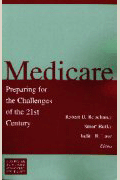This analysis is part of the USC-Brookings Schaeffer Initiative for Health Policy, which is a partnership between the Center for Health Policy at Brookings and the University of Southern California Schaeffer Center for Health Policy & Economics. The Initiative aims to inform the national health care debate with rigorous, evidence-based analysis leading to practical recommendations using the collaborative strengths of USC and Brookings.
Medicare beneficiaries have the option of receiving health coverage either through “traditional” Medicare, in which the government directly pays providers for all covered services, or by enrolling in a private Medicare Advantage (MA) health plan. If beneficiaries opt for the latter, Medicare pays the plans a fixed monthly amount for each enrolled member, and MA plans assume full financial responsibility for providing all Medicare-covered benefits to their enrollees.
Thirty-three percent of all Medicare beneficiaries now enroll in MA plans. However, the current structure of the competitive bidding process for MA plans is plagued by a poor bidding structure, which results in inefficiently high plan bids, a complex choice environment for consumers, and uneven subsidization of MA enrollees based on location.
In “A proposal to enhance competition and reform bidding in the Medicare Advantage Program” (PDF), Steven M. Lieberman, Loren Adler, Erin Trish, Joseph Antos, John Bertko, and Paul B. Ginsburg propose two key changes to the MA bidding process to lower prices and enhance choice for consumers.
The authors propose revising the current contracting process to focus on promoting price competition, as well as standardizing the benefits offered under MA plans to improve comparison shopping and provide a common basis for plan bids.
“As our analysis illustrates, converting Medicare Advantage to a competitive bidding system offers an opportunity to make the program more efficient and produce significant federal budgetary savings without shifting costs to beneficiaries. Greater program efficiency should be achievable by incentivizing MAOs to compete on price for a standardized product, rather than competing primarily on benefit generosity, as is largely the case today.”
The authors estimate their proposal would save the federal government $10 billion annually, and reduce Medicare Part B premiums across both MA and traditional Medicare beneficiaries by approximately 2 percent a year.
Read the full paper here.
Steven Lieberman is the president of Lieberman Consulting, Inc. Erin Trish is a consultant to a capital management firm on issues related to health care. Outside of these affiliations, the authors did not receive financial support from any firm or person for this article or from any firm or person with a financial or political interest in this article. They are currently not an officer, director, or board member of any organization with an interest in this article.













